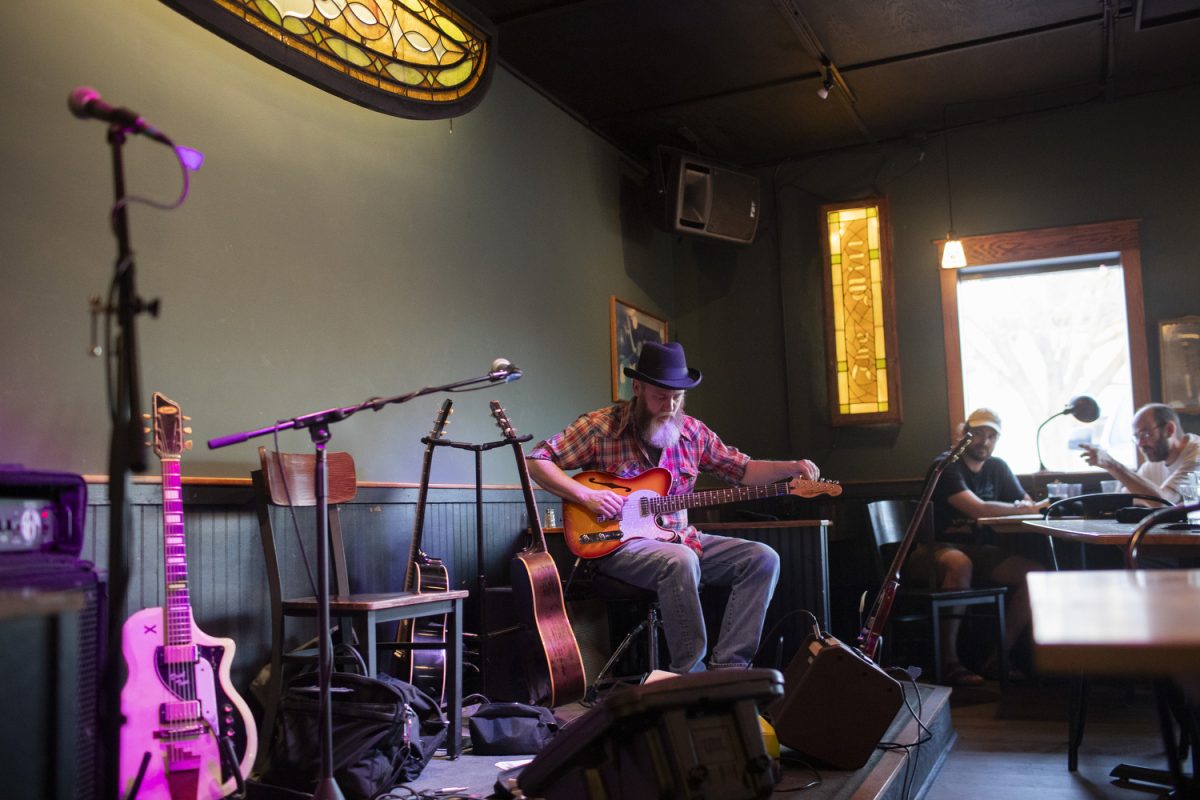In a final goodbye to fans and artists of the Mill, the local bar and music venue posted its hopes for the future of the Iowa City live music scene on Facebook in 2020.
“After 17 years of keeping the Mill going through its 58th year in business, it’s time for us to step away. We hope that someone else might want to take over the mission to preserve this institution,” the business wrote in its post. The post went locally viral, garnering over 1,000 reactions and 280 comments.
When the venue closed in 2020, co-owner Marty Christensen set out on another entrepreneurial venture. He opened the Black Angel in 2023.
The bar is named after Iowa City’s Oakland Cemetery Black Angel statue, originally created as a memorial for the Feldvert family. Surrounded by superstition and ghost stories, the monument is alleged to have been cursed since it was erected in 1912.
“[The naming of The Black Angel] was sort of a joke really. The have been so many restaurants in the space where the Black Angel is. The humor is that it is sort of a cursed location. The curse of the monument and the curse of the restaurant,” Christensen said. “But it also is an iconic Iowa City name, and no one has ever really co-opted it.”
While he wanted his new space to encompass the charm of the iconic former venue, Christensen did not want the Black Angel bar to be merely a replica—he wanted it to bring something unique to Iowa City. With a current capacity of 45 people, The Black Angel provides an intimate space for performers and listeners.
In contrast, the Mill had a capacity of 250 people and brought in internationally touring acts, ranging from pop band Japanese Breakfast to alternative indie singer Caroline Rose. Despite the difference space, the values between the Mill and The Black Angel have some similarities.
The Black Angel typically books singer-songwriters and folk artists, though its stage is big enough for, at most, three musicians. Solo artists and small bands are the typical acts that occupy the Black Angel’s lineup.
However, Christensen has concerns with his programming.
“Live music just isn’t as popular as it used to be,” Christensen said.
A musician himself, Christensen described himself as “pretty picky” when choosing artists.
“It’s about authenticity, dynamics, and artistic sensibility rather than just a filler to me,” he added.
Dan Padley is an Iowa City musician who has performed at both the Mill and the Black Angel.
“Oh god, I loved performing at the Mill. I started playing at the Mill when I was in the Jazz department during undergrad,” Padley said. “I think the vibe [at The Black Angel] has carried over as far as the decor and the nice listening room.”
The Mill often hosted variety shows with an open mic where poets, rap artists, and singers were encouraged to perform. Christensen’s goal with the Black Angel was to further spotlight local talent. To him, good music is more important than profit.
“The Mill was a meeting place when it came to all of the arts. That community function was one of the big losses,” Christensen said. “I am quite honestly hopeful that the Black Angel can fill that void to some extent.”
Another musician, Bo Ramsey, who previously performed at the Mill, played at The Black Angel on April 14. Ramsey, with one Grammy award and two more nominations under his belt, cherished both times he played in the Iowa City venues.
“I think [Christensen] really has something going with The Black Angel,” Ramsey said. “I played at the Mill many, many times. It had a good sounding room and a good sounding stage, and, when you make music, that is important.”



